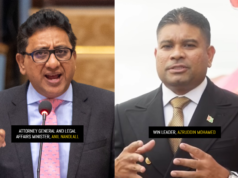The People’s Progressive Party/Civic (PPP/C) has announced plans to overhaul Guyana’s 911 emergency system during its next term in office. In fact, the party intends to expand the use of technology in policing to ensure greater operational efficiencies. This was confirmed this week by he party’s General Secretary and the country’s Vice President Dr. Bharrat Jagdeo.
Jagdeo signalled a broad push to digitize law enforcement and improve public accountability.He explained that the planned upgrade will ensure all calls to police stations are recorded at the station and also at a central control center. The Vice President said, “We intend to, at the police stations, if you make a call to a police station then the call gets recorded there and gets kicked to another national system where it gets recorded.”
This dual recording system is aimed at preventing instances where officers deny receiving reports from the public. He added that this will be necessary, “So later, a policeman can’t say… I didn’t hear, I didn’t get this call, I didn’t receive it because it’s recorded somewhere and the content of the call would be recorded.”
The improvement to the 911 system forms part of the administration’s wider effort to build what Jagdeo described as a “digital society,” which includes modernising law enforcement, banking, and public services.
He noted that the PPP plans to execute this in its next term. He assured that moving in a digital direction will create job opportunities, especially for young people, to manage and operate the new systems.
Jagdeo explained, “So I can tell you that it would require a lot of new people that we have to hire into the system, particularly young people because some of the systems can’t run with the same mindset that some people who are currently manning them have because they are not attuned to using technology to solve problems.” However, he noted that there are plans to retrain those individuals.
Moreover, he also spoke about the government’s electronic ticketing system, which is already being used for traffic enforcement.
Jagdeo said while some members of the public have expressed displeasure at receiving automated tickets, the technology has proven effective at eliminating bribery and holding even individuals accountable.
“There’s been a big public support for cameras and e-ticketing systems and a lot of that policing using the police using more technology in solving crime…no one can request a bribe you can’t negotiate with a camera. So if you’re a politician or you’re the commissioner of police and you speed, you’ll get the ticket,” he said.
Jagdeo noted that the e-ticketing system will soon be expanded to monitor vehicle fitness and insurance compliance. Cameras will automatically flag violations, reducing the need for roadside stops and manual checks.













